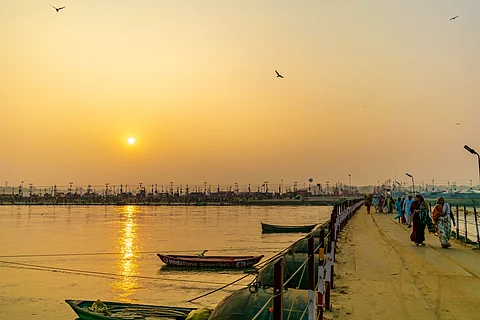
- Destinations
- Experiences
- Stay
- What's new
- Celebrating People
- Responsible Tourism
- CampaignsCampaigns
- SubscribeSubscribe
- Buy NowBuy Now

Formerly called Allahabad, Prayagraj is one of Uttar Pradesh’s largest and most historically rich cities. Situated at the sacred meeting point of the Ganga, Yamuna, and Saraswati rivers, the city holds great significance in India’s freedom struggle and is the birthplace of Jawaharlal Nehru, the nation’s first prime minister. Recently, authorities have announced plans to promote the city as the ‘City of Temple Corridors,’ another branding initiative in a series aimed at marketing the city.
The new initiative aims to generate some excitement ahead of the Ardh Kumbh in 2031. According to reports, the project will focus on enhancing and promoting temple corridors by connecting major religious sites throughout the city. The objective is to create a more seamless, enriching, and attractive experience for pilgrims and tourists from India and around the world.
According to reports, a recent development in the campaign is the introduction of the Tourism Tracker, a digital system designed to monitor tourism trends and assess the performance of religious and tourist sites in Prayagraj. The tracker will deliver monthly reports on visitor numbers—both domestic and international—alongside data on hotel occupancy, transport services, and event management.
Officials believe this tool will highlight areas needing further investment and improvement, helping to ensure a smoother experience for visitors. Regular analysis of this information will enable authorities to address issues promptly, supporting sustainable tourism growth in the region. Central to the initiative is the promotion of temple corridors, enhanced in preparation for the Mahakumbh in 2025. This includes the restoration and connection of significant, yet previously neglected, temples such as the Dwadash Madhav cluster, part of a project valued at over INR 129 crore.
Other significant sites, including the Bade Hanuman Temple near Sangam, Akshayvat, Saraswati Well, and Bhardwaj Ashram, will be highlighted as part of the initiative. Plans include organising Ganga Aarti ceremonies and cultural events at these locations, creating lively centres for pilgrims and tourists alike.
To improve visitor experience, multilingual signboards will be installed throughout the temple corridors, with tenders soon to be issued by the municipal corporation. Additionally, steps will be taken to curb unauthorised vendors, ensuring these sacred spaces remain respectful and accessible for all visitors.
Formerly known as Allahabad, Prayagraj is a city steeped in history and spiritual significance. It is best known for the Triveni Sangam, the sacred confluence of the Ganga, Yamuna, and the mythical Saraswati rivers—a site revered in Hinduism and mentioned in ancient texts as one of the holiest places of pilgrimage. The city’s historical importance was solidified during the Mughal era, when Emperor Akbar recognised its strategic value and founded a new city in 1583, naming it Illahabas (meaning "Abode of God"). Over time, the name evolved into Allahabad, before officially becoming Prayagraj in 2018.
The best time to visit Prayagraj is from October to March. These months offer pleasant weather with cooler temperatures, making it ideal for exploring the city's attractions and participating in outdoor activities.
The nearest airport to Prayagraj (also known as Allahabad) is Prayagraj Airport (IXD), also known as Bamrauli Airport, located about 12 km away. For railway travel, the primary station is Prayagraj Junction (PRYJ).
Prayagraj offers a rich mix of historical, spiritual, and cultural experiences. Begin at the Triveni Sangam, the sacred confluence of the Ganga, Yamuna, and Saraswati rivers. Nearby stands the Allahabad Fort, built by Emperor Akbar. Explore Anand Bhavan and Swaraj Bhavan, former residences of the Nehru family, now museums. Stroll through the Mughal-era Khusro Bagh, or admire the Gothic grandeur of All Saints Cathedral. The Allahabad Museum and Jawahar Planetarium add depth to the city’s cultural offerings. Don’t miss a boat ride at Sangam for a moment of spiritual calm. Wander local markets, savour street food, and if visiting during the Kumbh Mela, immerse yourself in one of the world’s largest religious gatherings.
